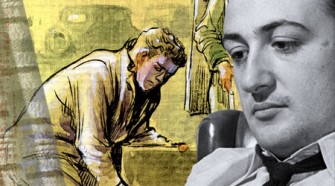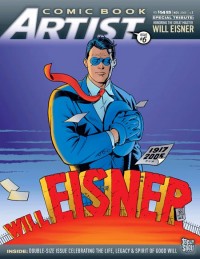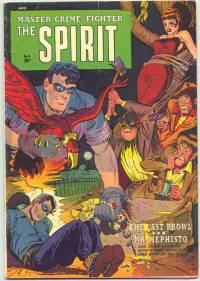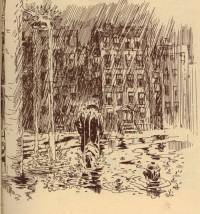 Home > CR Interviews
Home > CR Interviews A Short Interview With Jon B. Cooke
posted April 21, 2007
A Short Interview With Jon B. Cooke
posted April 21, 2007


I don't know anything about Jon B. Cooke except 1) his magazine
Comic Book Artist has consistently won industry awards this decade making Cooke
the comics interviewer for a subset and generation of comic book fans, 2) he's always been polite and helpful on the phone, through the electronic mail and in person, and 3) he and his brother Andrew have made a documentary film about the late cartoonist
Will Eisner,
Will Eisner: Portrait of a Sequential Artist. That film debuts this week at the
Tribeca Film Festival, so I thought it would be a nice time to chat with the comics magazine maker turned film producer about his start in comics, his frequently late comics magazine, and the Eisner film itself. Like a man who's done the questions portion of a few such talks in his time, Mr. Cooke was an extremely gracious interview subject.
The following was edited for style and flow.
*****
TOM SPURGEON: Jon, I don't know anything about you until you kind of showed up, fully formed, with your magazine. Do you mind putting together a version of who you were when you got into comics and how that happened?
 JON B. COOKE
JON B. COOKE: Hmmm... you want the good version or the bad? Seriously, comics have been a huge part of my life since the early 1970s, when
my brother Andrew and I lived through a true golden age of the form. I was obsessed with the form's many variants, whether
Jack Kirby's Fourth World,
Dan O'Neil's Odd Bodkins,
Jack T. Chick's religious pamphlets,
P*S Magazine,
National Lampoon's Son O' God, and even those
Kurt Schaffenberger GRIT comics. Reprint material was coming out in droves, the
Seuling conventions were in full swing,
Steranko's comic histories were on the bookshelves, and
the undergrounds were stretching the limits of the form... it was a very fortuitous time to become a comics aficionado.
Our two older brothers also appreciated comics, so all four Cooke brothers (with yours truly as "Ye Ed") collaborated on a fanzine entitled
Omega Comics Magazine Review, which lasted for a couple of years (with a maximum circulation of probably 25 for the six to seven issues), ending after being retitled
Omegazine.
In high school and college I confess to being more interested in girls and partying than funnybooks, but I still kept up some interest. At the
University of Rhode Island, I was editor of the campus alternative (read: hippy) magazine,
The Great Swamp Gazette, which (along with
Omegazine) solidified my passion for print production. I established a career in graphic design, working at advertising agencies, etc.
About 15 years ago, because the centennial of the birth of
Howard Phillip Lovecraft, I started a digest-sized magazine entitled
Tekeli-Li! Journal of Terror, which, despite being well-regarded, was a self-publishing (i.e., financial) debacle. The horror 'zine folded after four issues.
In 1995, my very first day on the Internet lead me to
The Jack Kirby Collector, where I quickly became associate editor. I pitched
TwoMorrows publisher John Morrow the idea of doing a mag for the "other guys," and
Comic Book Artist was born. After 25 issues, I moved the mag over to my pals at
Top Shelf Productions, where
CBA has been since 2003.
 SPURGEON: What is the status of your magazine work right now? Has the partnership with Top Shelf worked out to your satisfaction?
SPURGEON: What is the status of your magazine work right now? Has the partnership with Top Shelf worked out to your satisfaction?
COOKE: The erratic publishing frequency of
CBA is entirely my fault, as there have only been six issues in the past four years, but look for the mag to return by late summer, with the return ish devoted to
Peter Bagge, as well as a retrospective on
Weirdo magazine.
I love being with Chris [Staros] and Brett [Warnock] at Top Shelf, and have been very satisfied. I also do book projects with TwoMorrows to this day, and am happy as a clam to continue working with John Morrow.
SPURGEON: Can you talk about the beginnings of the Eisner film project? I'm particularly interested in two things: I know your brother is in film, but what drove you to be involved? And I'd love to know about when you knew that the film project was going to go from an idea to reality -- even working film to final film -- because there are so many ways a project like this can be sidelined?
COOKE: Ever since the days of
Omegazine, Andrew and I have always been searching for ways to collaborate. I have contributed my design talents and editorial abilities to his film projects, and he's written and done research for my publications... brothers are great as collaborators because, despite the rough times, you always end up loving the guy, y'know? Anyhoo, we collaborated on a comic-book concept,
Prime8, which, after the debut ish, has yet to get off the ground...
The idea for a film documentary on the life and career of Will Eisner was mine. I was watching an episode of the PBS series
American Masters and thought, dagnabbit, why doesn't Will get the same kind of treatment? I was friendly with the legendary creator and thought, waitaminnit, why not hook up with Andrew and then pitch Will? My brother leapt at the idea and Will was definitely receptive (with certain conditions, of course, which should come to no surprise for anyone who encountered the superb business acumen of William Ervin Eisner). Andrew gathered an experience film crew, a group of talented folks who believed in the concept enough to volunteer, and I believe we started shooting interviews in 2002.
We worked on the film when we could find the time, and I think we were all pretty confident that eventually the task would be completed. But, frankly, Will's death in 2005 turned it into a mission of the highest priority. Personally, I was devastated that Will had not lived to see the fruit of our efforts, but it made completion all the more important.
If you knew my brother, you know that one of his greatest virtues, aside from his creative talents, is tenacity. For Andrew, when faced with a challenge and a worthy goal, it's simply damn the torpedoes... (And the loyalty, support and work of our other collaborators -- editor/producer Kris Schackman, and producers James D. Lee and Ben Tudhope -- absolutely ensured that this production would get finished.
 SPURGEON: It's my understanding you've done the interviews -- is that true?
SPURGEON: It's my understanding you've done the interviews -- is that true?
COOKE: I've conducted
most of the interviews, with Andrew pitch-hitting the times I couldn't make it to the city. I live in Rhode Island, while Andrew lives in New York City, where most of the shooting was done. A couple of the Q&As were from other filmmakers who were gracious to share footage after having shelved their own documentaries.
SPURGEON: How did you prepare for them?
COOKE: Frankly, I don't do a great deal of research
per se prior to an on-camera sit-down. I'm pretty knowledgeable overall and the interesting thing about conducting documentary interviews as, say, compared to doing 'em for my mags and books, is that because we mentally map out the chronology and emphasis, it's compiling snippets of anecdotes to fill in the overall picture. (Still, you never know what you can get, so it's helpful to be flexible in the queries...)
SPURGEON: What was your basic approach like -- did you really nail people down, or did you let them talk at length, for instance -- and how was it different than your print approach?
COOKE: The trick with documentary interviews is to have the subject speak not in the form of answering a question, but in declarative statements... it really is an art, if you get my drift. I'm hardly
Mike Wallace-style in this project; the film really is a cinematic appreciation of Will Eisner and less an expose...
 SPURGEON: Other than the interviews, can you describe your involvement, particularly vis-a-vis your brother?
SPURGEON: Other than the interviews, can you describe your involvement, particularly vis-a-vis your brother?
COOKE: Well, I have the comic-book connections through
CBA -- the Rolodex -- so often I'm the guy who sets up the interview subjects. Andrew and I collaborate on the narrative direction -- hardly much of debate given that it's pretty much a standard chronology -- and then it's a discussion of working out the logistics. I'm also the
de facto graphic designer/PR guy, given my publications/advertising background -- though we have engaged a publicist for the Tribeca phase.
I gotta be completely honest to say that in most ways this is Andrew's show. He and editor Kris Schackman have devoted hundreds and hundreds of hours to the actual hands-on creation of the production. I can't tell you how proud I am of him and Kris, and I'm lucky as all get out to be a part of it, y'know? To see my name up there on screen alongside my brother is a long awaited moment, believe you me.
 SPURGEON: Now, at one point, your brother talked about a version that was approximately 1:45 in length. Is that the length of the film as it's playing the festival? What would for instance be some of the last stuff you'd trim to make the feature that length?
SPURGEON: Now, at one point, your brother talked about a version that was approximately 1:45 in length. Is that the length of the film as it's playing the festival? What would for instance be some of the last stuff you'd trim to make the feature that length?
COOKE: I
think it's about one hour, 50 minutes, but maybe I'm off. I'll find out on Thursday! [Editor's note: Cooke wrote in on Monday to say "Andy tells me the documentary is 96 minutes long."]
Anything that was edited was basically trimmed for timing purposes... tightened up, so to speak, sometimes minutely... the magic of film is often in the pacing and, lemme tell ya, editing is a
very tedious process... watching paint dry; that sort of thing. The significant last-minute stuff was for Andrew and Kris to edit in both
Jules Feiffer, who was our final interview subject, and
Art Spiegelman's opening and closing voice-over.
SPURGEON: Can you tell me how you guys approached material other than the interviews? Did you uncover archival Eisner footage and were you able to use that? I know that you used some of the Shop Talk
tapes, but how did you provide visuals for that?
COOKE:
Denis Kitchen, Eisner friend, art agent and archivist -- never mind legendary underground comix creator/publisher in his own right -- and Will's lovely wife Ann were
extremely generous and helpful in sharing rarely-seen home movies and stills, never mind the exquisite original art and printed materials, and tons of other stuff.
As far as the art direction of the documentary, that is courtesy of the extraordinary work of editor/executive producer Kris Schackman. His design sensibilities -- using, for instance, extremely detailed close-ups of Will's iconic signature, as the visual motif of the production -- are seen in full-force in
Will Eisner: Portrait of a Sequential Artist, and I cannot express just how delighted I am with his extraordinarily fine results.
The Eisner home movies are amazing... you see Eisner, his parents and his sister cavort for the camera in the early 1940s; Eisner in the U.S. Army brandishing an M-1 rifle; Eisner honeymoon footage on the beaches of Bermuda... there's even shots of the
Eisner & Iger Studios featuring a
very young
Jack Kirby,
Jack Cole,
Lou Fine. Just incredible stuff. Denis shared some never-before-seen 8mm film of
R. Crumb,
Gilbert Shelton,
Jay Lynch,
Skip Williamson and others... proving, oh how young they once were! There's other goodies in there, even a nude still(!) of Will, but allow me to keep some secrets until the big premiere!
As for the "Shop Talk" sequences, you'll see...
SPURGEON: Did you start with a feature-length film in mind, or did you build from a half-hour or shorter length? Can you describe the developmental process? How is the film different than then one you envisioned when you first stated working?

COOKE: Our general idea to start regarding length was 53 minutes or so, enough to fill up an hour on, well,
American Masters or the
Biography Channel. But we soon discovered that Will's diverse and fascinating career was just too big for a single hour. Try as we might, there's just too much story to tell.
Frankly, upon viewing the various cuts, my opinion is that the production started out as a documentary worthy of television. This is not to disparage the work or the medium, mind you...
Ken Burns is on TV, after all! But it did truly grow into a feature perfect for the big screen, because it became infused with more and more meaning. I knew the bare bones of the "Eisner story" for a good deal of my life, and it may be hard for some folks to imagine it contains profound meaning, but in being involved in this production, has shown me -- and hopefully the audience, as well -- a depth I hadn't previously considered.
SPURGEON: Was there anything about Mr. Eisner's life that surprised you?
COOKE: I was surprised to learn that Will and Ann had two children, John and Alice, and to discover what was the emotional catalyst for producing his first graphic novel,
A Contract With God.
SPURGEON: Since he was so well-liked in so many circles, how do you avoid making your film a hagiography? Was it important to you to maintain some critical distance, and if so, how might we see that in the final film?
COOKE: Certainly the film is an appreciative and celebratory piece. I'd also add a subjective word, "appropriate." It's not overly critical -- how much criticism is due Eisner anyway? -- and, yes, we could've included looks at the creation of the comic-book "sweat shop," or "accusations" of thriftiness, etc. But they didn't fit the narrative and you're always stretched for time anyway. Sure, as a creative person myself, I would have loved to have more "conflict," so to speak, in the picture but not at the expense of manufacturing it, y'know?
It's not for me to tell you how reverential the movie is... that's for you to judge, I reckon, but for whatever it’s worth, I think it's right on the money. You're right: Will Eisner was very well-liked, and I'm pretty sure people will be leaving the theatre with that very impression and probably liking him themselves...
There is critical discussion of the racist caricature
Ebony, the Spirit's sidekick.
 SPURGEON: What would you ideally like an audience seeing your film with fresh eyes to take away from the film regarding Eisner's life?
SPURGEON: What would you ideally like an audience seeing your film with fresh eyes to take away from the film regarding Eisner's life?
COOKE: That Will's innovations mattered. That he had a positive impact in the field and within American culture as a whole.
SPURGEON: What specific contributions do you think you're making to our wider understanding of the man and artist?
COOKE: I like to think that
Will Eisner: Portrait of a Sequential Artist shows the guy as a fleshed-out person who took up challenges in his life and often did the best he could, able to turn tragedy and pain into art.
 SPURGEON: What's next for you, Jon?
SPURGEON: What's next for you, Jon?
COOKE: I gotta make some money! I'll be returning
CBA to a regular schedule, slowly getting my book projects back on track, and hopefully working with Andrew again on another film project. Frankly, I'd like to do some creative writing at this point... probably something in comic-book form, though celluloid is always very enticing! Hear of any freelance gigs?
*****
Will Eisner: Portrait of a Sequential Artist opens this Thursday at the Tribeca Film Festival.
*****
note: I swiped the above photo of Jon Cooke, Will Eisner and Andrew Cooke at the 2004 San Diego Con for use here fully recognizing it's the property of the Cookes and their film and that it was previously used in more proper fashion in Bob Andelman's fine interview with Andrew Cooke. I hope they don't mind.
*****


